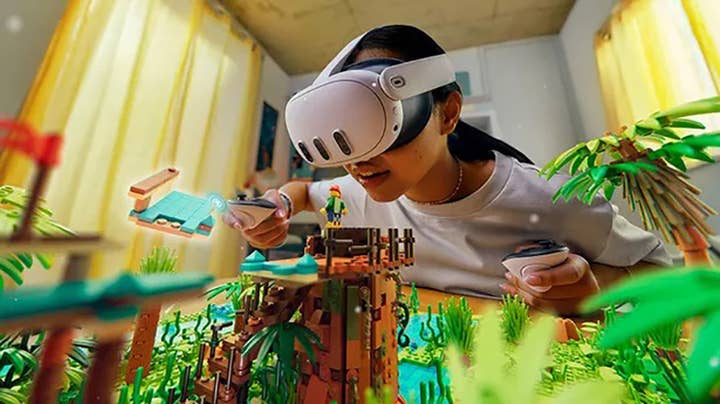Meta's Quest 3 fires the starting gun on consumer AR devices | Opinion
Apple and Meta are betting big on augmented reality – but expectations of a revolution to rival the introduction of smartphones should be tempered
There was a point, somewhere in the years after the commercial release of the Oculus Rift in 2016 launched excitement around virtual reality into the stratosphere, when it became clear that this was not going to be the Next Big Thing that many of its proponents had hoped for.
VR was exciting on many levels; the technology pioneered by Oculus' headset was advancing rapidly, and already allowing many of the science fiction dreams of VR immersion to become a reality. However, consumers were slow to come on board. Headset sales were relatively slow, even as more consumer-friendly devices like the Meta Quest and PlayStation VR arrived, and even those who bought a headset seemed to be spending relatively few hours with the devices. Virtual reality was building up into a solid and very interesting niche but seemed destined to remain confined to that niche – and so the talk of evangelists in this area shifted to AR, the next step beyond VR which, they claimed, would be vastly more useful, more appealing to consumers, and ultimately a much, much bigger market.
Augmented reality, or mixed reality – the terms are largely interchangeable – uses a headset to add virtual elements to the real world around you, and effective implementation of that idea has become something of a holy grail for technology firms. For all the interest in this category, nobody has actually brought a fully-functional AR headset to market yet. Microsoft's HoloLens was an impressive early effort, but never resulted in a consumer product; Magic Leap made enormous promises and collected vast amounts of investment, but has pivoted to providing enterprise devices with rather less hyperbolic claims attached to them.
That all changes next month, when Meta launches the Quest 3 – its latest standalone VR headset, whose headline feature is its advanced AR capabilities. It will be joined in the next year by Apple, whose ambitions in AR will finally come to fruition with the launch of the Vision Pro – although that device, at over $3,000, is stretching the definition in terms of being a consumer launch.
After years of discussion about how it's going to be the next big thing, AR will finally see devices launched by two of the world's biggest tech companies
To get technical, both of these devices are Passthrough AR, meaning that they are VR headsets with high-fidelity cameras that can pass through a representation of the real world around you, augmented with virtual objects and overlays. This is a little different from HoloLens or Magic Leap, both of which are "true" AR devices that project virtual elements onto clear lenses that the user views the real world directly through. That's a distinction that may or may not end up being important; as camera fidelity improves it seems like passthrough will ultimately be the more sensible option, but advocates of true AR claim that the advantage of being able to see the real world unfiltered through the lenses will not be so easily overturned.
What this means in big-picture terms is that the AR space, after years of discussion about how it's going to be the next big thing, is going to finally see devices launched by two of the world's biggest technology companies, Meta and Apple, starting from next month.
These companies don't share the same strategy, per se; Meta comes to AR as an addition to its existing VR products, pricing its headset around the $500 range, while Apple is arguably making a much bigger bet on VR as an entirely new category, with its initial device commanding a premium price seven times higher than Meta's device (though one would assume, and hope, that even Apple isn't deluded enough to think that AR can become a mass-market proposition without a dramatic fall in that price over time).
They do, however, share the same core challenge: a skeptical public whose reaction to VR was more or less "that's cool, it's fun for a bit, I don't really want it as anything other than a curiosity." Their reaction to AR has yet to be gauged, although the backlash to Google Glass remains an informative and sobering lesson about the limits of social acceptance for certain types of technology in public spaces, at least.
AR has some very, very big expectations to live up to. Its initial positioning as a technology that would take the advances in VR and make them into something with much wider applicability and appeal was already setting up high stakes; Apple's interest in the field has only driven that to fever pitch. The reason for the insanely high interest in AR among investors and analysts is actually external to the technology itself, to some extent; investors are desperately looking for the next big technological leap forward, the next innovation that's going to drive change and profit in the way that smartphones did a decade ago.

Smartphones themselves have clearly reached a kind of technological equilibrium point. They improve in a fairly calm, orderly, and frankly boring fashion, but there's little room to innovate around the core design of a handheld slab of black glass with front and rear cameras. They're now a consumer staple device; there's no more explosive growth to be had in smartphones, just competition between manufacturers over a large and relatively stable market segment. Investors who made millions, or billions, as smartphones exploded in the 2010s desperately want to recapture that energy; investors who didn't make money in that boom are even more desperate to get a replay.
For AR to deliver that kind of boom, it would need to fulfil some pretty difficult criteria – essentially becoming not just a new kind of display, or a useful tool with some niche applications, but rather a whole new kind of general-purpose computing device that will be a de rigeur part of life in the 2020s.
But it's far from clear that this is actually going to happen. The argument that AR is a much bigger potential market than VR is well-founded – VR by its nature requires isolating the user entirely from their surroundings, which is great for immersion but a hard sell for a lot of consumers. AR bypasses this issue while delivering many of VR's best features; users remain immersed in their surroundings, able to see and communicate with people around them, while also accessing layers of information and interactive content arranged in the virtual space.
Just because the conventional wisdom has suggested that AR is going to be a bigger market than VR doesn't mean that's guaranteed in any way
Consequently, there is potential for applications not only in gaming but for productivity, creativity, research tools, telepresence, and many other fields – but that potential remains hypothetical. We've seen all sorts of demos of AR over the years, but all of them had that very distinct sense, of being a demo. The capabilities of the technology are clear. The actual use cases are less so. I can imagine some very cool gaming uses for AR tech, such as combining AR and telepresence concepts to allow people to do things like playing tabletop games remotely with one another, but thus far nobody has really come up with a concept that sounds like a bona fide mass-market hit for this technology. That applies to work applications as well as gaming; there have been a lot of demos that show cool-looking use cases that are highly specialised, but nobody has really shown off anything that suggests that a significantly large group of people might end up using these devices as a regular part of their working day.
The contention appears to be that if you build it, they will come; create a decent AR platform and some developers will come along and change the world. It worked for smartphones, after all – apps developed for those have genuinely changed society, commerce, and culture in enormous ways in the past decade, few of which we could have envisioned when Steve Jobs held up the first iPhone. Perhaps AR will work in the same way – but it's worth noting that the actual appeal of a smartphone was incredibly evident right from the first iPhone, even before apps were a possibility.

Early smartphones were a dramatic improvement over previous mobile phones, solving a whole host of problems and opening up new possibilities for their users. Apps on those devices were what ultimately changed the world, for sure; but the device category itself was immensely appealing even before apps made smartphones a cornerstone of modern life. Does AR have that same appeal? If not, it faces a barrier before it's even started; smartphone apps could only become so popular and essential because smartphones already had an installed base that the apps could draw on and make themselves relevant.
A further potential issue arises from the huge gap in price and functionality between Meta and Apple's devices; there's a risk that Apple's device, though overpriced for the market, sets expectations that Meta's more reasonably priced device can't meet, leading initial demand to fall between two stools.
Ultimately, though, the real test for Quest 3 (and Vision Pro when it arrives) will be to go beyond the "I can't wait to see what people create for this" mentality, and show consumers why they should buy these devices regardless of any possibly-maybe-hypothetical apps that might appear for them later.
Growing the installed base from day one is the challenge. Just because the conventional wisdom has suggested that AR is going to be a bigger market than VR doesn't mean that's guaranteed in any way. There's a skeptical world to win over, and that's going to require more than vague allusions to a possible shining future.

